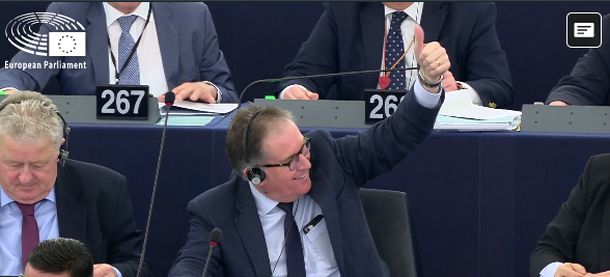Following six years of negotiations and strained relations, Morocco and the European Union (EU) today finally signed a new but limited fisheries partnership agreement for the next four years. The new deal especially favours the Spanish and Portuguese fleets. Morocco, on the other hand, has used the last six years wisely to build its own modern fisheries industry. Afrol News, 28 July 2005.
Morocco-EU fisheries deal finally renewed
afrol News
28 July 2005
http://www.afrol.com/articles/16866
Following six years of negotiations and strained relations, Morocco and the European Union (EU) today finally signed a new but limited fisheries partnership agreement for the next four years. The new deal especially favours the Spanish and Portuguese fleets. Morocco, on the other hand, has used the last six years wisely to build its own modern fisheries industry.
The new fisheries partnership agreement between Morocco and the EU enters into force in March 2006 and is to last for four years. Morocco is set to receive a financial compensation of 144 million euros for giving large quotas to European trawlers in its territorial waters.
The deal was signed in Brussels today by the EU's Fishery Commissioner Joe Borg and the Moroccan Minister of Foreign Trade, Mustapha Mechahuri. The agreement still has to be ratified by the Moroccan parliament, the parliaments of the 25 EU member states and the EU parliament - thus the seven months delay before it enters into force.
The new agreement today was announced by Mr Borg at a press conference in Brussels, saying it had been the result of "four days of intense negotiations" between the parties. The new fisheries agreement - worth euro 144 million for Morocco - is far smaller than the previous 1995-1999 deal, which had been set at euro 500 million.
Also this time, the EU's compensation for its fisheries rights is earmarked, going to the Moroccan fishery sector and environmental programmes. Some 36 million euros has been earmarked for the implementation of a fisheries sectoral policy in Morocco. "This concerns the development of the Moroccan fleet, scientific cooperation, setting up temporary company groups," Mr Borg explained.
According to the new agreement, the EU annually may deploy a total of 120 vessels and take out an annual quota of 60,000 tons of small pelagic species for the industrial pelagic vessels. The 1995-1999 deal had included around 600 European fishing vessels annually and, according to the EU, was "by far the most important agreement between the EU and a third country." The new deal is far less extensive.
The earlier EU-Morocco fisheries agreements had plaid a vital role for the industry in Spain and Portugal, its suspension leading to large unemployment in these countries' fisheries sector during the last years. There was therefore a great pressure on Brussels to reach a new agreement with Morocco despite the Kingdom's pricey demands.
Morocco's interest in an ample deal with the EU had diminished during the 1990s. The Kingdom, located very close to the European markets, decided to develop its own modern fishing fleet and fisheries industry, especially based on the rich fisheries outside Moroccan-occupied Western Sahara. During the last six years, investments in the sector have been large and have started to pay off. A new large-scale deal with the EU was now out of the question.
Given its good negotiating position, Morocco was able to strike a smaller but good deal with Brussels. The EU is to pay euro 300,000 each vessel each year; far above the average of its fisheries deals with third parties. The lowest price it pays per vessel currently is euro 11,111 to São Tomé and Príncipe, while the EU pays euro 346,774 per vessel to the government of Mauritania - the record so far.
The countries benefiting most from the new deal will be Spain and Portugal. The fishing rights under the new agreement will mainly benefit Spanish small-scale vessels, for example, those fishing for sardines and anchovies, in addition to deep long-liners and trawlers, artisanal pole and line vessels and industrial pelagic vessels.
Mr Borg did not clarify whether the new agreement also included the waters of occupied Western Sahara, but an earlier answer to this question by the Spanish government said that negotiations included the same conditions as previous deals. These had included Western Sahara waters.
The exiled government of Western Sahara earlier this year strongly protested negotiations over its fishery resources with the occupying power, saying this was illegal according to international law. The Sahrawis base their conclusions on a legal opinion issued by the UN two years ago, thus creating a new legal basis for the Morocco-EU negotiations.
Here is the EU Council's legal advice on fishing in occupied waters
Hans Corell criticizes EU fisheries in Western Sahara
The former Legal Counsel to the UN Security Counsel, Mr. Hans Corell, comments on the EU's fisheries activities in Western Sahara.
EU Court reaffirms position on Western Sahara
Polisario has a case, but it should be pursued when the time is right, Court implies.
European Parliament disregards Court and adopts Morocco fish deal
Notwithstanding four consecutive rulings of the EU's highest Court calling such a practice illegal, the European Parliament has just now voted in favour of the EU-Morocco Fisheries Agreement that will be applied to the waters of occupied Western Sahara.


